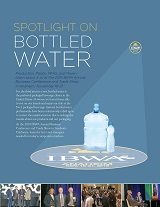Like Howard Beale in Network, owners of bottled water companies are mad, and they’re not going to take it anymore.
You’d probably be upset too if people were saying incorrect, inflammatory stuff about your products – especially if your products are a healthy, safe, and convenient option for consumers.
Breck Speed, CEO of Mountain Valley Spring, a bottled-water company based in Hot Springs, spoke up to the Arkansas Times this week after the Sustainability Council at the state’s namesake university announced that it is starting “an education program aimed at reducing, and ultimately eliminating, the use of bottled water on campus.”
Speed tells Arkansas Times reporter Doug Smith:
“There are lots of useful things they could do to promote sustainability…Instead, they’re going after an Arkansas industry. There’s no milk bottled here, it’s all shipped out of state. There’s no soda pop bottled here. We [water bottlers] are the only Arkansas-based beverage industry. And we employ a lot of people.”
The Sustainability Council’s intention is clear: reduce the amount of plastics thrown away, and protect the environment while doing so. It’s a great idea, and one the bottled water industry supports.
However.
Trying to rid the campus of bottled water won’t help the cause. Most every industry uses natural resources to make a product, and bottled water is one of many food and beverage products that use plastics.
Should the Sustainability Council also push for students to not drink beverages containing sugar, calories, or other generally unhealthy ingredients, since they come in plastic bottles too?
Should the Sustainability Council ask students to stop showering, since shampoo, conditioner and body wash come in plastic containers?
Should the Sustainability Council tell students to stop eating microwaveable dinners, since they use plastic trays?
(Thankfully, beer is contained in aluminum or glass.)
Of course, the response to those questions is that “unlike bottled water, you can’t get soda out of your tap.” Well, you can’t get bottled water out of it, either. Some bottled water comes from natural groundwater springs that never touches a municipal water system, while other types fo bottled water do, in fact, come from a public, tap source. However, in any case, bottled water goes through a number of filtering and purification processes, and is strictly regulated by the U.S. government and other groups. It is as safe, if not safer than, tap water.
Bottom line: the answer to the environmental crisis is not found in banning bottled water, but in finding comprehensive solutions that consider all the industries that use plastics in containers.
Speed, at Mountain Spring, understands that the Sustainability Council doesn’t want to ban bottled water outright, but that doesn’t satisfy him. And he’s not done fighting, as the Sustainability Council is:
“…raising money to run ads,” [Speed] said. “If they’re going to enter a marketing campaign against bottled water, we’ll have to respond. I’ll run ads. I’ll talk to the UA’s head honchos. I’ll do whatever it takes.”
Speed has already crossed swords with Fayetteville Mayor Dan Coody, another bottled-water foe. Speed said in an Arkansas Times article Aug. 14 that bottled water is under attack nationally from three groups — public-water officials, environmentalists, and companies that sell home water-filtration systems.



























